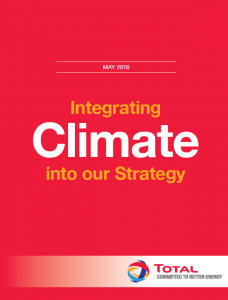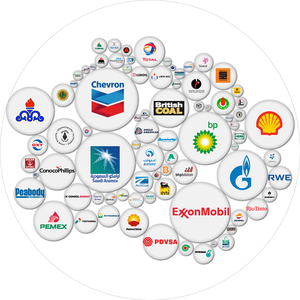Total S.A., the fourth largest oil and gas producer worldwide, has published a comprehensive plan explaining how the company intends to alter its business practices and energy holdings in order to be consistent with the International Energy Agency’s 2°C Scenario in the next twenty years. “Integrating Climate into our Strategy” is the first strategic plan published by a large fossil fuel corporation that seeks to achieve a concrete climate change mitigation goal. Total will focus on portfolio overhaul, technological innovation, and policy advocacy, as its three-pronged approach to helping the world keep cumulative emissions under 1000 gigatons of carbon dioxide equivalent from 2013 to 2050.
One of the company’s top priorities is to exit the coal business. Total already ceased its coal production, in August 2015, after selling its affiliate Total Coal South America, and plans to withdraw from coal marketing by the end of 2016. At the same time, the company will turn its focus towards increasing the proportion of natural gas in the mix, which already accounts for roughly half of its reserves and production. Total also confirms in this report that it does not conduct oil exploration or production in the Arctic ice pack, and that it has recently decreased its exposure to Canadian oil sands, as well.
Total also intends to increase the share of renewable energy in its portfolio to 20% in twenty years. To that end, the company intends to complete a biofuel refinery in France next year, increase its investments in solar energy and energy storage technologies, and develop a renewable power trading business. Total is pledging 25% of its $7.4 billion R&D budget towards clean tech and environmental issues between 2015 and 2019, and is also investing $150 million in 25 innovative energy start-up companies.
Under the strategy, Total will continue to be a major producer of oil and gas. But it recognizes that its ability to produce these fuels while remaining within the 2°C scenario will depend on the viability of carbon capture, use and storage technologies. The company thus intends to allocate up to 10% of its R&D budget towards decreasing the costs of such techniques.
Finally, Total is strongly advocating for a globalized carbon pricing mechanism that links the main economic regions together, a policy that CEO Patrick Pouyanné declares is the “most efficient financial mechanism to change the rules of the game quickly”. Total uses an internal carbon dioxide price of $30 to $40 per ton when assessing its investments, and believes such a price tag would force a complete switch from coal to natural gas.
The strategy put forth by Total is commendable, displaying convincing corporate responsibility and a public commitment to concrete goals and timeline. It remains to be seen whether the company sticks to its plan, and if this can become a guiding framework for other companies to follow in the future.




